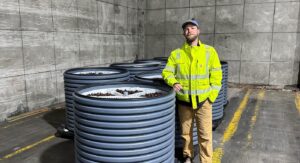Kansas City-based angel investment firm iiM (Innovation in Motion) has invested $2.37 million in a variety of early-stage agrifood tech startup companies covering everything from a bio-based plastic alternative to oral vaccines for livestock and companion animals.
iiM typically invests $150,000 to $300,000 in each company with its largest investment so far totaling $530,000. The six agrifood and animal health startups in the portfolio so far are:
- AgriSync (Waukee, IA) enables farmers to connect with their advisors live using video and other in-app workflow features in order to solve real-time problems as they occur.
- Green Dot Bioplastics (Emporia, KS) makes bioplastic and bio-composite pellets.
- innate.ly (Colorado Springs, CO) offers cloud and smart device ready software-as-a-service platforms which improve the business practices and processes in animal health and protein production.
- Mazen Animal Health (St. Joseph, MO) creates oral vaccines in an efficient and low-cost system for production and companion animals that eliminates the need for refrigeration and enables multiple animal dosing.
- MNI (Medical Nutrition Innovation) (Philadelphia, PA) has developed a medical food sold as a powder that is calorie-dense, taste-neutral and contains essential micronutrients for patients suffering from malnutrition.
- P&P Optica (Waterloo, Ontario) combines in-line smart imaging technology with data analysis in a novel way to help ensure the food we eat is safer, higher quality and produced with less waste.
Launched in 2013 by two principals of real estate investment group Cohen-Esrey, iiM spent its early years exploring various possible investment focus areas across sectors but settled on animal health, food and agriculture, and human health as its verticals, according to Lydia Kinkade, managing director and founder of iiM.
Backed by a syndicate of investors with a range of different expertise from physicians, animal health experts, and agriculture professionals along with entrepreneurs from other industries, Kinkade says iiM is bringing a new investment approach to these sectors. It also has syndicate members who are less active in the process but who invest alongside the investor members under the same terms. Syndicate members are able to participate in startup presentations, review due diligence materials and make separate co-investments.
“Our dedicated team of professionals is responsible for identifying prospective investments and performing extensive due diligence,” she told AgFunderNews. “So many people in our investor member group have built careers in those industries so they have expertise in that area and can understand deeply what the big problems are and if what the entrepreneurs are saying is legitimate from a due diligence perspective.”
Within the animal health and agriculture verticals, iiM has not limited itself to a particular segment or technology. Precision agriculture is particularly interesting to Kinkade, as well as finding companies that tap into consumers’ growing interest in food system traceability. The only sector that iiM has crossed off its list is human pharmaceuticals, primarily due to the massive amount of startup capital that these companies require. And while drones are not totally off the table, Kinkade is wary of some of the hype surrounding the technology and has yet to come across something that captures the excitement and attention of iiM’s investor members.
She’s also interested in connecting technology dots across sectors.
“I see a lot of companies in human health that may have the opportunity to enter the animal health world, but they just need the right connections or even a suggestion of the idea that there is an opportunity there. So, if we can provide guidance to see other opportunities, we do,” she said.
Kinkade expects iiM’s typical investment size to increase with its syndicate, with a target of at least $500,000, for a minimum portfolio size of 30 companies. It has already provided followed-on capital in subsequent funding rounds for two of its portfolio companies.
Just 10% of the iiM syndicate are women and while two of the investor’s nine portfolio companies have female CEOs. The ratio of women-led startups to men-led startups in her pipeline is about the same.
“I don’t think my experience as a woman in this role is much different than what a man would experience – it’s challenging to build something that’s brand new and turn it into a sustainable business venture. However, especially in the ag and animal health industries, it’s not uncommon for me to be the only woman in the room. This is something that I notice, but have not felt like it’s been a barrier. In my experience, entrepreneurs are looking for investors who bring more to the table than money, and investors are looking for the best and brightest entrepreneurs – without a preference for males or females.”
While excited about the sector, Kinkade finds the often conflicted discourse surrounding some of the science behind innovations challenging.
“There’s a lot of confusion about the merits of science and what it can do to really benefit our population – not only humans but animals and plants, too. There’s a lot of good research and science being done that can be misinterpreted and taken differently than what its intent was to be,” she says. “If you really take the time to understand what the researchers are doing and to understand the potential benefits, I think people would be less nervous about some of the things that are going on from a research and technological advancement point of view in both food, agriculture, and animal health.”





